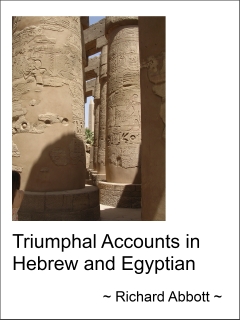|
|
|
Triumphal Accounts in Hebrew and Egyptian
|
|
|
Comment on this using Twitter:
|

- Title
- Triumphal Accounts in Hebrew and Egyptian
- Summary
- This is the e-book version of Richard Abbott's PhD thesis accepted by Trinity College
Bristol and Bristol University in January 2012. It describes, and defends, some of the
academic background assumed in the full-length
novel In a Milk and Honeyed Land. See
http://www.kephrath.com/TriumphalAccounts.aspx for
more details.
- Publication date
- Published October 2012 and available in Kindle and general epub editions.
- See http://www.kephrath.com/WhereToBuy.aspx for stockists.
- ISBN
- 978-0-9545-5352-4 (Kindle)
- 978-0-9545-5356-2 (general epub)
- Extract
- Abstract of “Triumphal accounts in Hebrew and Egyptian”
This thesis considers the literary structure of the triumphal song recorded in Exodus 15 of the
Hebrew Bible, commonly known as the Song of the Sea and attributed in the biblical text primarily
to Moses and secondarily to Miriam. This literary structure is investigated in relation to triumphal
material and other poetry written in Egypt, predominantly in the New Kingdom period. It is argued
that cross-cultural literary influences shaped the construction of the Song of the Sea, to the point
that the author’s familiarity with Egyptian styles and conventions can still be recognised.
The exploration begins with a review of both Hebrew and Egyptian poetry, considering some of the
typical patterns used in each culture. In particular, the construction of poetic couplets and the
relationships between A- and B-lines of these couplets is studied in order to derive some basic
principles of composition in common use.
The Israel Stele of Merenptah is chosen as a suitable point of comparison, and the large-scale
structures of both this work and the Song of the Sea are compared and contrasted to highlight key
areas of stylistic overlap. In particular, the use of chiasmus to structure these works, the use of
divine or Pharaonic names as structural markers, and the use of complex arrangements of geographical
or ethnic names in each text are highlighted.
In the later stages of the work, some additional lines of evidence are reviewed which lend support
to the idea that Egyptian habits of writing may have been familiar to writers in early Israel, even
after the decline of Egypt’s territorial ambitions in the Levant. This in turn suggests ways to
understand the subsequent incorporation of the Song of the Sea into the larger Exodus narrative,
as well as the social location of the author.
|
|